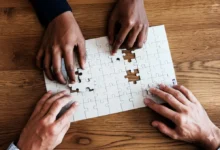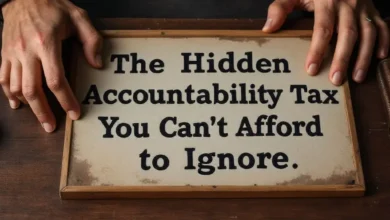The Accountability Mirror: Staring Down Reality for a Better You
Identifying self accountability through honest self reflection

Key Takeaways:
- The Accountability Mirror is a powerful tool for honest self-reflection, helping you identify weaknesses and areas for improvement in any area of your life.
- Regularly using this practice fosters personal growth, builds resilience, and drives you toward achieving your goals, whether fitness, career, or relationships.
- While inspired by David Goggins’ extreme approach, adapting the Accountability Mirror to your own needs and comfort level is crucial for sustainable positive change.
Ever feel like you’re not quite living up to your potential? Do you set goals but struggle to follow through? Maybe you need an “Accountability Mirror.”
The Accountability Mirror is more than just looking at your reflection. I believe it’s a tool for brutal honesty with yourself.
At its core, the concept is simple. Stand in front of a mirror and confront your reality. This means acknowledging your weaknesses, failures, and the excuses you make.
It’s about taking 100% responsibility for where you are in life, good or bad.
Instead of blaming others or circumstances, you look inward and ask yourself: “What can I do differently?”
David Goggins and the Mirror
David Goggins, the ultra-endurance athlete and motivational speaker, is a big proponent of the Accountability Mirror.
He’s known for his extreme discipline and pushing himself to the absolute limit. For Goggins, the mirror is a tool for intense self-motivation.
He would write down his insecurities and shortcomings on sticky notes and place them on his mirror. This visual reminder served as fuel to overcome obstacles and push through pain.
It helped him get through Navy SEAL training and numerous grueling athletic challenges.
I think he looks at it less as an aesthetic tool and more as a weapon that’s used for war.
He doesn’t want to look good, he wants to be good.
Beyond Extreme: Adapting for Everyday Life
While Goggins’ approach is powerful, it can be intimidating, and maybe even overkill for the average person.
You don’t need to train for an ultramarathon to benefit from the Accountability Mirror. I believe the key is to adapt the concept to your own life and goals.
It isn’t about self-loathing or berating yourself. Instead, it’s about honest self-assessment and identifying areas where you can grow.
Think of it as a constructive conversation with your reflection.
How to Use Your Own Accountability Mirror
Here’s how to get started with your own accountability mirror, in a way that works for you:
- Find a Mirror: Pick a mirror you see regularly, like in your bathroom or bedroom.
- Choose Your Focus: Decide what area of your life you want to improve. This could be your fitness, career, relationships, or finances.
- Identify Your Weaknesses: Honestly assess your shortcomings in that area. What are you avoiding? What excuses are you making?
- Write It Down (Optional): Write down your weaknesses, goals, and action steps on sticky notes and place them on the mirror. This provides a visual reminder.
- Look in the Mirror Daily: Spend a few minutes each day looking at your reflection and reading your notes.
- Ask Yourself Tough Questions: Are you staying true to your commitments? Are you making progress? What can you do better today?
- Take Action: Most importantly, don’t just stare at the mirror. Use the insights you gain to take concrete steps toward your goals.
- Reflect on What is Working: Regularly review your notes and adjust your action plan as needed.
Benefits of Using the Accountability Mirror
Using the Accountability Mirror offers several benefits that can lead to a more fulfilling and successful life.
I would include these as advantages to consider:
- Improved Self-Awareness: You gain a deeper understanding of your strengths and weaknesses.
- Increased Motivation: Facing your shortcomings head-on can ignite a fire within you to make positive changes.
- Enhanced Goal Achievement: By holding yourself accountable, you’re more likely to stay focused and persistent.
- Greater Resilience: Learning to overcome challenges and setbacks builds resilience and mental toughness.
- Boosted Confidence: As you make progress and achieve your goals, your self-confidence will naturally increase.
Challenges and How to Overcome Them
The Accountability Mirror isn’t always easy. You will confront uncomfortable truths about yourself. I am here to show you the way to overcome this. Here are some common challenges and how to overcome them:
| Challenge | Solution |
|---|---|
| Feeling Overwhelmed: | Break down your goals into smaller, more manageable steps. Focus on making small, consistent progress each day. |
| Negative Self-Talk: | Challenge negative thoughts and replace them with positive affirmations. Focus on your strengths and past successes. |
| Lack of Motivation: | Remind yourself of your “why.” Why is this goal important to you? Visualize the positive outcomes of achieving your goals. |
| Fear of Failure: | Reframe failure as a learning opportunity. Everyone makes mistakes. The key is to learn from them and keep moving forward. |
| Inconsistency: | Set a specific time each day to use the Accountability Mirror. Make it a non-negotiable part of your routine. |
Examples of Accountability Mirror in Action
Let’s look at some practical examples of how you can use the Accountability Mirror in different areas of your life:
- Fitness: You might write down, “I will exercise for 30 minutes, 5 days a week.” If you skip a workout, the mirror reminds you of your commitment.
- Career: If your goal is to get a promotion, you might write down skills to develop and actions to take. The mirror reminds you to work on those every day.
- Relationships: If you want to improve your relationship with your partner, you might write down, “I will listen actively and express appreciation daily.”
- Finances: You might write down your savings goals and track your spending. The mirror reminds you to stay within your budget.
The Science Behind Self-Reflection
Self-reflection, as practiced with the Accountability Mirror, is supported by research in psychology and neuroscience.
Studies show that regular self-reflection can lead to improved self-awareness, emotional regulation, and decision-making.
A study published in the Journal of Personality and Social Psychology found that individuals who engage in self-reflection experience greater psychological well-being and a stronger sense of purpose.
This is because self-reflection allows you to identify your values, goals, and motivations, which in turn, guides your behavior and choices.
Also, research suggests that self-reflection can activate areas of the brain associated with self-awareness and emotional processing.
This can help you better understand your emotions, manage stress, and build resilience.
Final Thoughts
The Accountability Mirror is a powerful tool for personal growth, I am not saying it’s the easiest thing you will do in your life.
It requires courage, honesty, and a willingness to confront your imperfections.
According to my experience, the key is to adapt the concept to your own needs and goals, and to approach it with compassion and understanding.
It’s about progress, not perfection.






